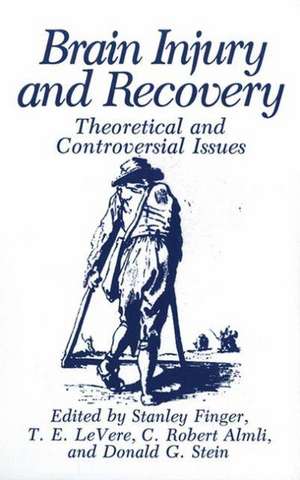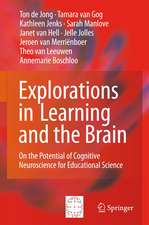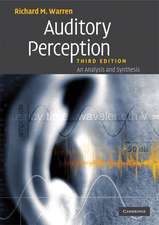Brain Injury and Recovery: Theoretical and Controversial Issues
Editat de C. Robert Almli, Stanley Finger, T. E. Levere, Donald G. Steinen Limba Engleză Paperback – 30 ian 2012
Preț: 372.97 lei
Preț vechi: 392.60 lei
-5% Nou
Puncte Express: 559
Preț estimativ în valută:
71.37€ • 76.32$ • 59.51£
71.37€ • 76.32$ • 59.51£
Carte tipărită la comandă
Livrare economică 17 aprilie-01 mai
Preluare comenzi: 021 569.72.76
Specificații
ISBN-13: 9781461282563
ISBN-10: 146128256X
Pagini: 392
Ilustrații: 362 p.
Dimensiuni: 152 x 229 x 21 mm
Greutate: 0.52 kg
Ediția:Softcover reprint of the original 1st ed. 1988
Editura: Springer Us
Colecția Springer
Locul publicării:New York, NY, United States
ISBN-10: 146128256X
Pagini: 392
Ilustrații: 362 p.
Dimensiuni: 152 x 229 x 21 mm
Greutate: 0.52 kg
Ediția:Softcover reprint of the original 1st ed. 1988
Editura: Springer Us
Colecția Springer
Locul publicării:New York, NY, United States
Public țintă
ResearchCuprins
1 Toward a Definition of Recovery of Function.- 2 Neural System Imbalances and the Consequence of Large Brain Injuries.- 3 Bases of Inductions of Recoveries and Protections from Amnesias.- 4 Neural Spare Capacity and the Concept of Diaschisis: Functional and Evolutionary Models.- 5 Kurt Goldstein and Recovery of Function.- 6 Assumptions about the Brain and Its Recovery from Damage.- 7 Mass Action and Equipotentiality Reconsidered.- 8 Margaret Kennard and Her “Principle” in Historical Perspective.- 9 Infant Brain Injury: The Benefit of Relocation and the Cost of Crowding.- 10 Arguments against Redundant Brain Structures.- 11 Another Look at Vicariation.- 12 Hughlings Jackson’s Theory of Localization and Compensation.- 13 The Parcellation Theory and Alterations in Brain Circuitry after Injury.- 14 Trophic Hypothesis of Neuronal Cell Death and Survival.- 15 Sensory Cortical Reorganization following Peripheral Nerve Injury.- 16 Is Dendritic Proliferation of Surviving Neurons a Compensatory Response to Loss of Neighbors in the Aging Brain?.- 17 Practical and Theoretical lssues in the Use of Fetal Brain Tissue Transplants to Promote Recovery from Brain Injury.- 18 Functional Electrical Stimulation and Its Application for the Rehabilitation of Neurologically Injured Individuals.- 19 Recovery of Language Disorders: Homologous Contralateral or Connected Ipsilateral Compensation?.- 20 Sensory Substitution and Recovery from “Brain Damage”.- 21 Emotion and Motivation in Recovery and Adaptation after Brain Damage.- 22 Recovery of Function: Sources of Controversy.











